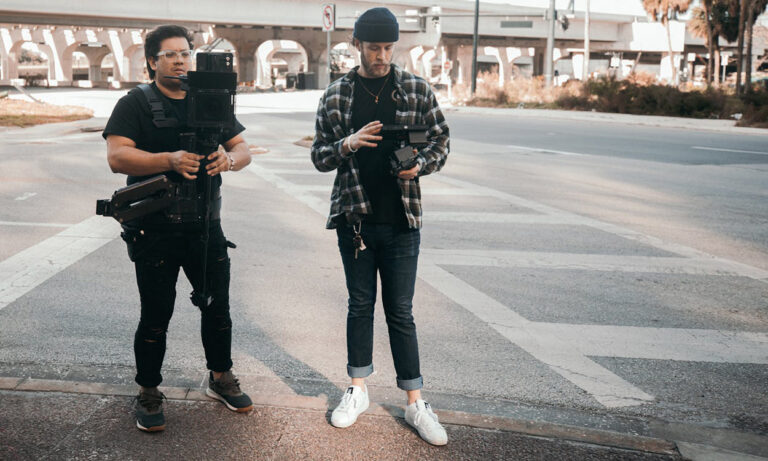When do TikTok’s random acts of kindness go too far? When consent goes out the window
Picture this: you’re sitting on a bench outside, sipping coffee and taking a well-needed break from a shopping spree. A stranger comes up to you holding a bouquet of flowers. They want you to have it. It’s not really practical for you to carry them around all day but you try to be nice. The interaction ends quickly and before you can protest or say anything more than “thank you?”, the man has vanished, all while you sat there being filmed by two of his friends, set up with a tripod, several feet away.
Unbeknown to you, the video they’ve taken will later be posted online for hundreds of thousands of people to gawk at. You’ve been used in a shallow attempt at kindness that really only served to boost the ego and the following of the person who filmed you.
Don’t get me wrong, it’s nice when people are kind. Heck, it’s even nicer to get free things, but when placed in the parasitic context of the TikTok machine, the experience quickly turns cold and empty. The subjects of the videos are used and have very little chance to give consent to be in the content creator’s final edit, unless they want to chase the assailant down and insist they delete the clip—if they’ve even realised they were being filmed in the first place, that is.
The experience described above is very similar to what happened to Melbourne-based Maree, who recently shared her story with The Guardian on 31 January 2023. “I wish I’d trusted my instincts and said no, it was all so quick,” she told the publication.
The woman confronted the two men standing nearby with a tripod, who almost immediately both denied having filmed her. The video, of course, went viral and saw Maree—a woman in her 60s—described as “elderly” by The Daily Mail.
In its article, the British tabloid went on to state that Maree was “moved to tears” by the ‘random’ act of kindness. “That was just cruel, I thought, to do that to a person—the whole ‘pathetic’ scenario…” she told The Guardian. “I am in my 60s, I have got grey hair, but it kind of upset my sense of how I’m perceived. I’d never really thought of myself as looking old.”
The video, posted by 22-year-old TikTok user Harrison Pawluk, received 50 million views, and 10 million likes. App users had become voyeurs into a small part of someone’s day. Although another successful video for the content creator, it left Maree feeling “dehumanised” and exploited for money. She had essentially become someone’s clickbait.
While feel-good content is nothing new to the wider internet at large, TikTok as a platform has a tendency to specifically push this style forward thanks to its short form video format. The likes of which has propped up allow a myriad of strange content creators to thrive, from the controversial Scar Girl to the clay slapping Pottery Boy.
Niche creators aside, it’s clear that kind content is still king online. This becomes evidently clear when you consider the fact that the #randomactsofkindness on the app has a staggering 416 million views. It does leave me wondering if people realise how exploitative this format can be.
A similar instance from November 2022 saw Australian TikToker Luke Erwin pretend to have a broken arm, and then ask strangers to open a bottle for him. Truly the most thrilling of social experiments if you ask me. In one of his viral videos on the matter, an elderly couple seem to ignore his call for aid. In the clip’s caption, Erwin pleads users to “be the one that helps.”
As you can imagine, the couple were torn to shreds in the comments section, which caught the attention of their daughter, Amal Awad who wrote for the Australian publication SBS News, pleading with people to view the video in a wider context. Awad pointed out that this type of content is often misleading and doesn’t give members of the public the space needed for a day of “respite” after shocking news, as was the case for her parents—or the freedom to, you know, not be accosted by random strangers on the street.
As Awad accurately pointed out, viewers know virtually nothing of the people featured in these popular formats. We’re all just being fed a narrative made to pull at one’s heartstrings.
These videos, while popular for obvious reasons, are missing an essential element—consent and mutual respect. For starters, more often than not no release forms or data protection are involved in the interaction. The nature and power of social media enables these content creators to act freely, regardless of whether or not they’re legally allowed to go up to civilians, filming and bothering them.
Algorithmic video platforms push young people in particular to pursue anything in the name of notoriety and exposure. And due to the extremely fast moving current of platforms like TikTok, issues such as this get swept under the carpet a lot easier—particularly when TikTok already has its hands full trying to wipe the internet of Andrew Tate.
Unfortunately in the 21st century, we don’t have much control over whether or not we’ll end up online, or at the mercy of a prankster or ‘good samaritan’ who wants to cash in on unsuspecting passers-by. These shallow and all too often cringey content creators need a wake-up call, and social media giants need to do a better job of protecting our right not to be filmed without consent.





